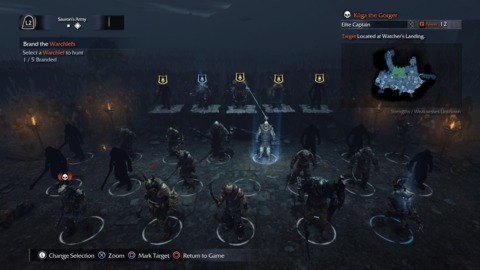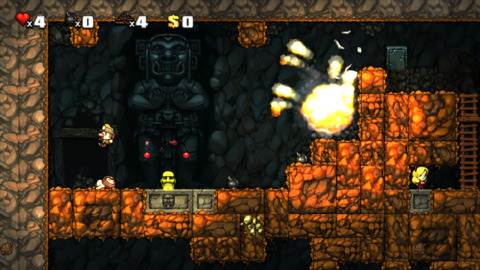There are very few games where the player cannot die, but each game handles the idea differently. Most games choose to ignore how ridiculous it sounds for the player to die over and over, some build the concept into the narrative, while others are beginning to reconsider what it means to die in a video game.

Middle-earth: Shadow of Mordor got me thinking about this, as it does a few at once, and represents a huge shift.
Dying in games exists for a few reasons. So much of modern design has origins in the arcades of yesteryear, and arcades wanted to take your money over and over. An easy way to ensure new quarters was to guarantee death. While most games don't require quarters anymore, the majority do follow a pattern: ask the player to accomplish a specific task, punish them if it's not completed, and ask them to do it again. That cycle is repeated, with punishment enforced through death and repetition. The game pretends as though nothing happened, as if no player has been present in the world prior to this one attempt. This approach has become more frustrating over the years, as games iron out any bump in the road to success. To not achieve success is, at times, considered a design fault.
We've come to accept this dissonance because, well, it's how most games work. And there's nothing wrong with this approach, and I've enjoyed plenty of games that embrace this point and move on.
In Shadow of Mordor, the fantasy setting allows the developers an easy out. The main character, Talion, is simply stuck between the realms of life and death. While he's present in reality, when he dies, he's not allowed access to the afterlife. Instead, he must return to reality. This would usually be enough, but Shadow of Mordor goes steps further with its Nemesis system. When a random enemy kills you (and you die often), they're promoted within Sauron's personal army. The enemy goes from a faceless AI in the crowd to a named archenemy, a moment typically scripted into a game, meaning every player has the exact same experience. Here, while Orc #2039 might have initially killed you, he's now become Gordar the Horrible. You'd never come back for orc #2039, but Gordar? Fuck that guy, off with your head! Each player death means something, as their world is permanently altered because of it. While I'm sure Nemesis took substantial time to build out, it allows the game to endlessly generate moments that would have been more expensive and time consuming to craft, and it wouldn't have been nearly as effective.
Of course, we've been watching other games play with these concepts for a while, it's simply been happening in more "hardcore" games. Both Spelunky and the Souls games are examples of games reinventing the meaning of death. Dark Souls and Spelunky riff on the same idea with differing results.

Everything in the world of Souls is static, and when the player returns to an area, nothing has changed. Their actions might alter based on how the player acts, but the soldiers who were around the corner last time will be around the corner this time, too. While the Souls games are known for being punishing affairs, once the player knows the lay of the land, it's merely up to them to navigate it. The game world isn't cheating, the player must learn to adapt. The consistency allows death to have meaning that isn't possible with how interlocking game systems usually work. Dynamic systems, in which the player cannot expect what happens, can generate surprise, but it also prevents them from internalizing lessons away from that death. A random car that runs you over might not be around the next time. Avoid the car, I guess? In a Souls game, it's often possible to see death as a positive; it's how you learn.
Spelunky's first incarnation was released the same year as Demon's Souls, and it's not a surprise to learn Spelunky's creator, Derek Yu, is a huge fan of the series. The similarities are a lovely coincidence. Spelunky's world is not static, but the rules are. The construction of the world is different every time the player jumps in, but the pieces used to build the world--enemies, items, objects, structure--are very familiar. The early hours of Spelunky (by early, we're talking dozens) are spent internalizing that ruleset. Though Spelunky has reactive physics that can sometimes result in unexpected events, 99% of Spelunky is completely known to the player, and it's a matter of applying the lessons of what's come before.

When you first play Spelunky, for instance, there's no way to know the chomping flower in the jungle section will eat you. Spelunky has a tutorial, but the tutorial isn't interested in explaining what Spelunky's about, only making sure you know how to jump, whip, and other basics of navigation. Everything else is up to you, and there's no way to understand Spelunky's rules without dying. Death is a teacher, and death is Spelunky's constant. This means the friction of death instilled by other games (read: death is bad) is reduced because, in Spelunky, death is expected. It's not possible to understand Spelunky without death, so death is good.
Even though I really enjoyed Alien: Isolation, it frustratingly straddled the line between both worlds. Isolation doesn't have any checkpoints, instead asking players to manually save at phones scattered throughout the game. It's easy to understand why this system exists. Since the player cannot rely on checkpoints, the moment you go without a save point, tension arises. When you've spent 15 minutes carefully navigating a series of hallways and vents, the desire for a save point becomes palpable. You begin frantically checking the map for the next place to save. Then, the alien shows up. You're terrified for two reasons. One, the alien is scary. Two, you don't want to replay that section again. But death is constant in Isolation, and it doesn't always feel fair. Thus, when you're forced to spend yet another 15 minutes in the same section of hallways and vents, the feeling isn't "oh, I've got this" because you've already been here, it's "oh, this sucks" because the tension building only works once.
In all of these games, the punishment angle still exists. You didn't kill that orc in Shadow of Mordor, you didn't beat that boss in a Souls game, you couldn't get past Olmec in Spelunky. But what the player takes away from that death is very different. There's value in it beyond the cycle of repetition. Shadow of Mordor presents a path to revenge and redemption, and both the Souls games and Spelunky encourage (nay, demand) success through failure. What we're learning is death can have multiple meanings in games, and that's a healthy, welcomed evolution of a concept left stagnant for way too long.

Log in to comment